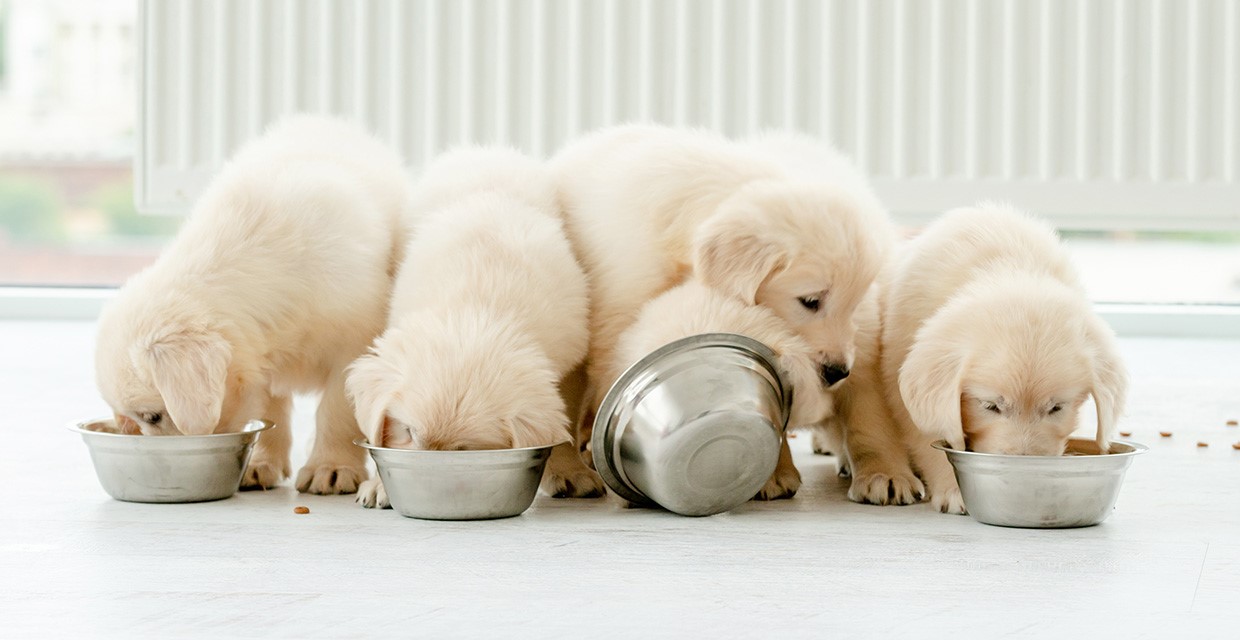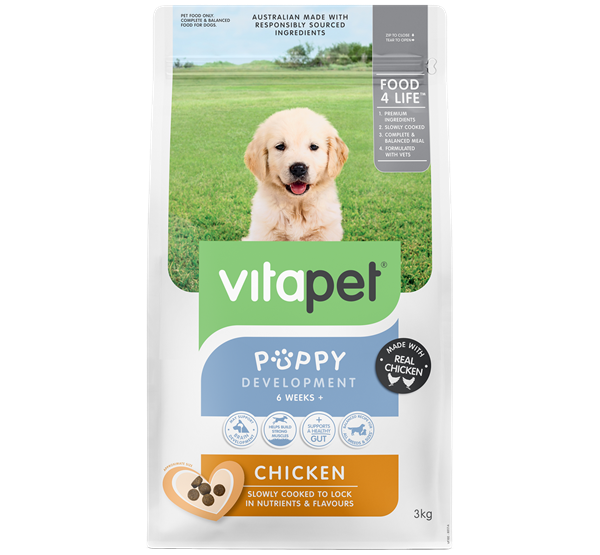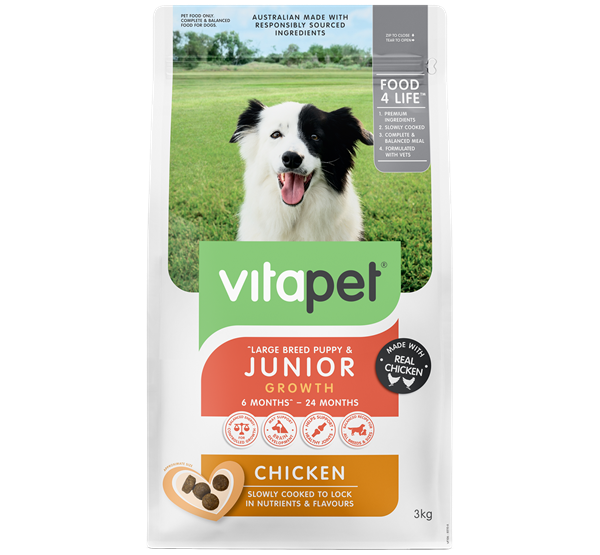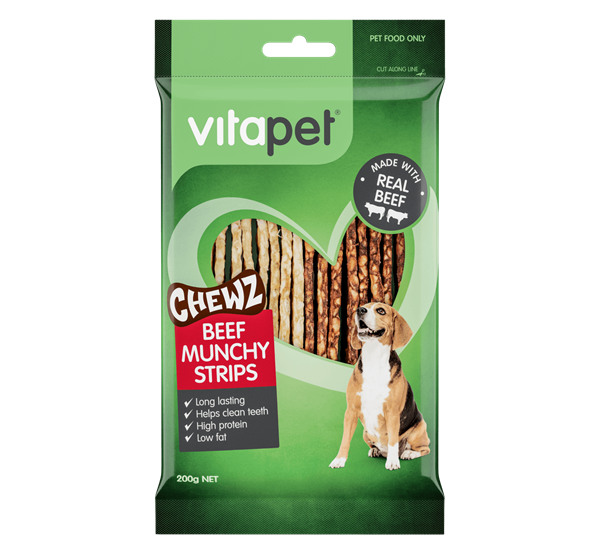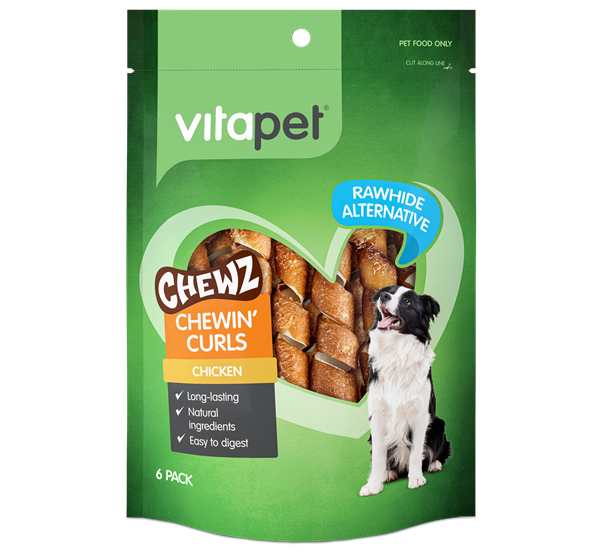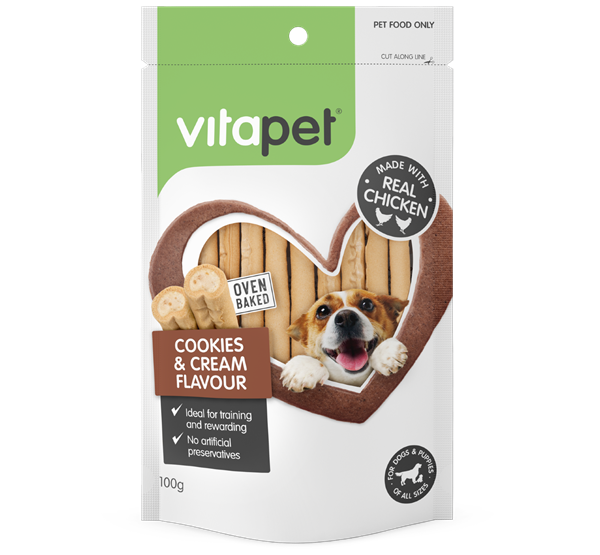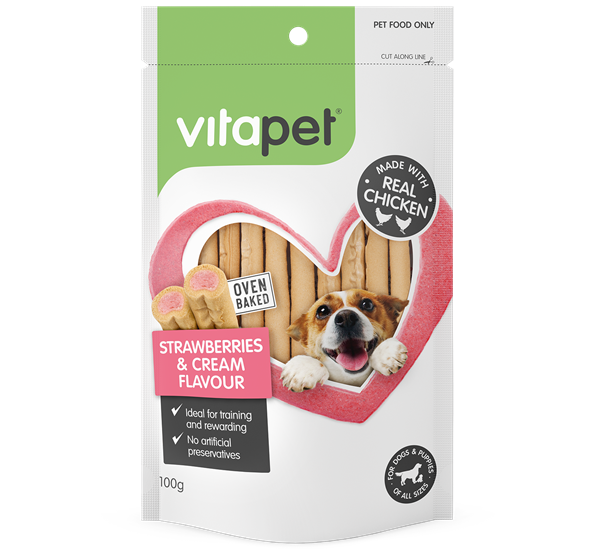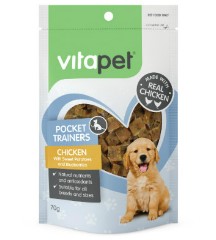You’ve probably heard of the saying, “You are what you eat”, right? But does this apply to puppies too?
Absolutely.
Imagine if all your growth was fast-tracked so that you were at your adult size by 12 months of age! When compared to humans, puppies grow at an incredibly fast rate, so the food they eat has a more immediate impact on their development. So, it matters more than picking fish food or bird food. In fact, a puppy’s diet is so important, that if you get it wrong, it can negatively affect them for life. And no-one wants that!
Exactly how does your choice of puppy food impact their growth and development?
How much protein should you look for when choosing a puppy diet?
Protein is the bricks and mortar of a growing body and so protein content in puppy food needs to be spot on. According to AAFCO, which brings together all the research in pet food and feeding, the minimum crude protein on a dry matter basis for growing puppies is 22.5% (this is calculated once all the water is extracted from the food).
Puppies have an incredibly high exponential growth rate – ranging from 13% per week for toy breeds to 17% per week for giant breeds. This means that we not only need to get protein right, but energy right too. Feeding the right ratio at the right time is why we should follow the recommendations given on-pack.
Does my puppy’s diet affect their joint development?
Yes, it certainly does. In fact, what you feed your puppy has permanent effects on your puppy’s musculoskeletal system.
Your puppy’s food needs to contain the correct calcium levels. Simply adding extra calcium to your puppy’s food doesn’t cut it. It’s more complicated than that. In fact because calcium and phosphorus need to be at the correct ratio to one another, and in the right proportion according to food energy density.
A ratio that is too high can lead to cartilage abnormalities, such as elbow dysplasia, which may require surgery later.
A ratio that is too low can lead to abnormal bowing of limbs and even bone fractures due to a lack of calcium laid down in the bone to strengthen it.
So, the best dog food for growth, is one that has been correctly formulated to make sure your puppy’s nutritional needs are met fair and square.
Can puppy hearing be affected by their diet?
The short answer is no. By 3-4 weeks of age, healthy puppies can generally hear very well and the majority of puppies are still feeding from their mother at this age, so diet generally does not impact a dog’s hearing and solids are usually started after their hearing has already developed.
What about my puppy’s organ development?
By and large, the organs form while your puppy is still in the womb, so what your feed your puppy won’t affect organ development as the work has already been done by the time solids are given. We do however need to provide the energy (or calories) and in particular the protein building blocks (mentioned above) to ensure that their organs grow and develop to their full capacity. Keeping the liver and kidneys active and working on a day-to-day-basis requires nutrients, after all. Similarly, your puppy’s largest organ is their skin, and this needs a whole load of protein to function at it's best – growing a thick and shiny coat, for example. The ingredients of your puppy’s diet can definitely affect gut health, (and the gastrointestinal microbiome). Inappropriate carbohydrates, not enough dietary fibre, poor quality proteins are elements that can cause an overgrowth of the wrong type of bacteria in the large intestine, leading to excessive flatulence and even toileting problems.
What impact does puppy food have on their toileting?
If a puppy’s diet is not properly balanced, or contains the wrong ingredients, this can impact their intestinal function and lead to poorly formed, sloppy poo. Apart from increasing your work-load by having to clean up more accidents around the house, if your puppy’s poos are not well-formed, this can interfere with toilet training, as your puppy doesn’t always know when he or she needs to go.
Too much variety and quick changes on your puppy’s menu can also cause diarrhoea, so a simple high-quality well-balanced diet is the way to go. Be sure to transition slowly (over at least a week) if you’re changing your puppy’s food.’ While it sounds like a strange goal, striving for ‘the perfect poo’ will help make toilet training go more smoothly and tells you that your puppy is healthy on the inside too.
References:
1. Peterson ME, Kutzler M. Small Animal Pediatrics: The First 12 Months of Life. 2011. Elsevier.
2. Association of American Feed Control Officials (AAFCO Guildelines): AAFCO methods for substantiating nutritional adequacy of dog and cat foods. 2014. www.aafco.org/Portals/0/SiteContent/Regulatory/Committees/Pet-Food/Reports/Pet_Food_Report_2013_Midyear-Proposed_Revisions_to_AAFCO_Nutrient_Profiles.pdf
3. McGeady TA, Quinn PJ, Fitzpatrick ES, Ryan MT, Kilroy D, Lonergan P. Veterinary Embryology. 2017. Wiley.












